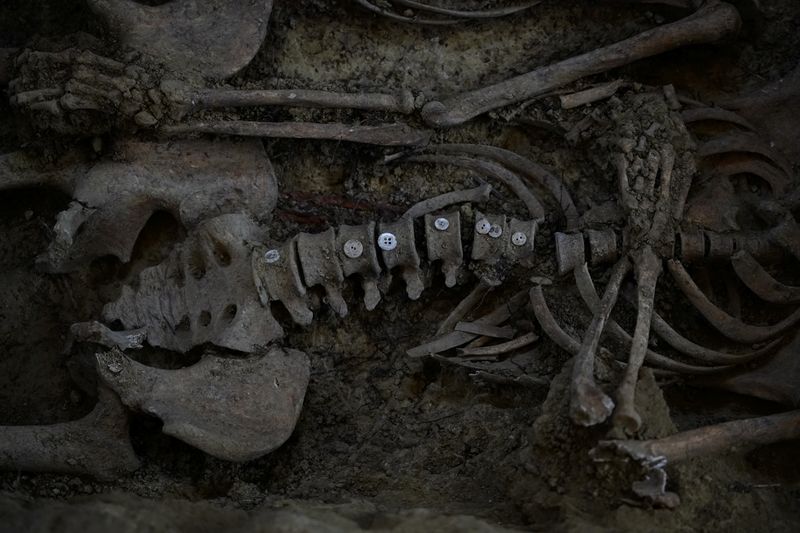By Juan Medina
FARASDUES, Spain (Reuters) - Archaeologists in northeastern Spain have uncovered the mass grave of 10 women killed by a fascist firing squad in the early days of the Spanish Civil War, drawing attention to the often overlooked plight of women in the conflict.
Well preserved white buttons trace a path up some of their spines, the last remnants of the clothes they wore on the day they were executed on Aug. 31, 1936 after being snatched from their homes in the village of Uncastillo the previous night.
Their bodies were dumped in a narrow pit in the local cemetery in neighbouring Farasdues, in the region of Aragon.
Mari Carmen Rios' grandmother Inocencia Aznares was among them.
"Why did they kill her?" Because they couldn't find my uncle? Because she could read and write? Because she voted for the republic? ... I don't know ... Nothing they did makes sense," Rios said.
More than 500,000 people were killed during the 1936-1939 war. Historical foundations estimate over 100,000 bodies remain missing, many in unmarked mass graves.
The leftist coalition government approved a bill in September to finance exhumations from mass graves as part of efforts to "restore democratic memory".
Academic research on the conflict, though extensive, has been overwhelmingly focused on the experience of men, said Cristina Sanchez, who investigates civil-war violence against women at Zaragoza University.
"Where are all the women? ... Now we are finding that they were present as victims of violence and as perpetrators."
Some were persecuted for their political leanings or activism but many more were killed as substitute victims for their male relatives, she said. Methods of execution were equally savage for both sexes.
"We have deaths by drowning, deaths by hanging, and the majority were killed by firing squad."
Excavations in Farasdues began in November but the massacre had remained lodged in the area's collective memory for decades, said archaeologist Javier Ruiz.
"Carrying off 10 women in one go didn't happen in many places, at least not in Aragon ... In Uncastillo these 10 women have never been forgotten."
Next to their grave, archaeologists uncovered another site with the bodies of at least seven men, who are yet to be identified.

For Rios, the excavation triggered powerful feelings of outrage, which later gave way to a sense of closure: "When you say 'We've found her, she's there, we're going to bury her with grandpa,' honestly it makes me very happy."